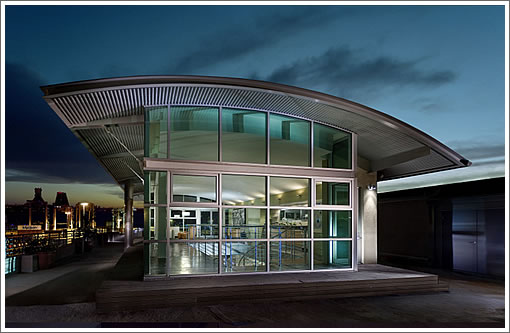218: Energy Saving Tips for Property Investors
08-23-2008
PropertyInvesting.net team
Here are some tips to help property investors save energy, save money and do  your part for the environment. Try these easy, low-cost or no-cost energy saving tips. And use the helpful websites recommended to find out more and review energy saving deals.
your part for the environment. Try these easy, low-cost or no-cost energy saving tips. And use the helpful websites recommended to find out more and review energy saving deals.
With oil prices ranging from $110 to $147/bbl and gas price rising in Western Europe and USA, energy costs have sky-rocketted adding burden to property investor's businesses. PropertyInvesting.net does not expect a return to the low energy costs of the period 1982 to 2002 (oil was as low as $8/bbl) - indeed we believe prices will continue to rise as China and India's appetite for oil/energy rises in the next two decades. So it's a good time to consider energy saving within your property portfolio, to reduce costs and increase profits.
1. Energy Saving Tips for your properties
Boiler Keep your boiler clean, lubricated and properly adjusted with annual maintenance. If your furnace is working at peak efficiency it will use less energy and cost less to operate. Clean or replace the filter every 1-2 months - a dirty filter reduces the airflow and forces the furnace to run longer to heat your home. Consider purchasing a new ENERGY STAR® qualified furnace with a variable speed motor. An average home can save up to $599 in natural gas and electrical costs annually when upgrading from a standard 60% efficiency natural gas furnace to a 95% efficiency furnace with a high efficiency variable speed motor.
Thermostat Install an ENERGY STAR programmable thermostat. You can save 2% on your heating bill for every 1 degree C you turn down your thermostat. With an ENERGY STAR programmable thermostat to consistently lower your heat when you don’t need it, you could save up to £50 a year! Lower your thermostat by 4 - 5 degrees Celsius (7 - 9 degrees Fahrenheit) while you're sleeping at night and when no one is at home.
 Laundry Choose a front loading washing machine. Not only does a front loading washing machine save water, it saves energy as well. It uses about 40% less water and about 50% less energy. Switch to cold when doing your laundry. 85 – 90% of the energy used to wash your clothes is used to heat the water. By turning the dial to cold on your washing machine, you help the environment, save energy, and save money. Wash full loads.
Laundry Choose a front loading washing machine. Not only does a front loading washing machine save water, it saves energy as well. It uses about 40% less water and about 50% less energy. Switch to cold when doing your laundry. 85 – 90% of the energy used to wash your clothes is used to heat the water. By turning the dial to cold on your washing machine, you help the environment, save energy, and save money. Wash full loads.
Weather-stripping Weather-stripping provides a barrier between the fixed and movable sections of doors and windows. Apply weather-stripping to operable windows, exterior doors, garage doors, and doors that lead to the attic.
Windows, doorframes, sills and joints Apply a sealant or caulk around windows, doorframes, sills and joints. On a windy day feel for leaks or use a couple of incense sticks to help identify leaks around windows, electrical outlets, vents and exterior doors. As well look for spider webs - if there is a web there is a draft.Use plastic window covers to help prevent heat loss. Keep return air grills and heating vents clear of furniture, rugs and drapes, so there is no interference with the flow of heat through your home.
Basement Add insulation to basement walls. If you have an unfinished basement or crawlspace, check for leaks by looking for spider webs. If there is a web, there is a draft. A large amount of heat is also lost from an un-insulated basement.
 Drapes & Blinds Close your drapes and blinds during the night. On sunny days, open south facing drapes and let the sun in, a natural source of heat. If you have large windows that don't receive direct sun, keep the drapes closed.
Drapes & Blinds Close your drapes and blinds during the night. On sunny days, open south facing drapes and let the sun in, a natural source of heat. If you have large windows that don't receive direct sun, keep the drapes closed.
Pipes, ducts, fans and vents Plug gaps around pipes, ducts, fans and vents that go through walls, ceilings and floors from heated to unheated spaces.
Showerheads and faucets Install low-flow showerheads and faucets.
Dishwasher Always wash a full load in your dishwasher and air-dry your dishes on the “energy saver” setting.
Garage Turn on the heat just prior to use, save by not heating it continuously.
Wood Fireplace Close the damper to prevent warm air from escaping through the chimney, and ensure the damper fits properly.
- Use the Equalized Payment Plan so you can average your bills and avoid peak winter bills.
- See what the big energy users in your home are and get suggestions for changes to save energy and money using energycheck, a quick an easy home energy audit found on the SaskEnergy website.
- For more energy savings tips visit the Office of Energy Efficiency, Natural Resources Canada website.
2 Summertime Energy-Saving Tips
These tips are designed to help you choose effective ways to reduce your energy bills. Some measures may not be relevant depending on climate, the age of your home and appliances, and past improvements made to your home.
The savings numbers are based on your total summer electric bill.
Fast and free tips
The average home spends about $1,900 a year on energy costs. But you can lower your energy bills and help save the environment at the same time!
Be a speedy chef
- Nothing is more energy efficient for cooking than your microwave. It uses two-thirds less energy than your stove.
Push a button to wash your dishes
- Surprise! Your dishwasher uses less water than washing dishes by hand. Then let dishes air-dry to save even more!
Fill up the fridge
- Having lots of food in your fridge keeps it from warming up too fast when the door is open. So your fridge doesn't have to work as hard to stay cool.
Cutting back unnecessary energy use is an easy way to reduce energy consumption while saving money. Here are some additional suggestions you can do at home, at absolutely no cost to you.
Turn up your thermostat 
Set your thermostat to 78 degrees when you are home and 85 degrees or off when you are away. Using ceiling or room fans allows you to set the thermostat higher because the air movement will cool the room. Always take into account health considerations and be sure to drink plenty of fluids in warm weather. (Save: 1 - 3 percent per degree, for each degree the thermostat is set above 72 degrees)
Use your appliances wisely
To help prevent electricity outages, avoid running your appliances during peak hours, -- from 4 p.m. to 6 p.m. -- or anytime an electricity emergency is declared.
- Do your laundry efficiently by using the warm or cold water setting for washing your clothes. Always use cold water to rinse clothes. (Save: 4%)
- Line dry clothes whenever you can. (Save up to 5%)
- When you need to use the dryer, run full loads, use the moisture-sensing setting, and clean the clothes dryer lint trap after each use. (save: 0.5%)
- Conserve energy by running your dishwasher only when it is fully loaded, and turn off the dry cycle and air dry dishes instead. (save: 1%)
Operating swimming pool filters and cleaning sweeps efficiently
- Reduce the operating time of your pool filter and automatic cleaning sweep to fourto five hours, and only during off-peak time. (Save: 1-2% per hour of reduction)
Eliminate wasted energy
- Turn off appliances, lights and equipment when not in use. (Save: 2%)
- Unplug electronic devices and chargers when they aren't in use-most new electronics use electricity even when switched "off." Turn computers and printers off at the power strip. (Save: 1-2%)
- Unplug or recycle that spare refrigerator in the garage if you don't really need it. This will save you up to $150 per year! (Save: 10-20%)
3 Inexpensive Energy Solutions
 Make a quick trip to your local hardware store to purchase inexpensive energy-saving tools and equipment.
Make a quick trip to your local hardware store to purchase inexpensive energy-saving tools and equipment.
Replace air conditioner filters
Dirty filters restrict airflow and can cause the system to run longer, increasing energy use. Replace filters monthly for maximum benefit. (Save: 1-2%)
Plug your home's leaks
Weather-strip, seal, and caulk leaky doors and windows and install foam gaskets behind outlet covers. (Save: up to 2%)
Choose ENERGY STAR® products
- Buy ENERGY STAR® certified table lamps and light fixtures, and replace your incandescent light bulbs that are used more than two hours per day with ENERGY STAR® compact fluorescent bulbs. For example, install compact fluorescent bulbs in your porch light if you leave it on overnight. (Savings: for each bulb you'll save 0.2 percent for each hour the bulb operates on a typical day. Therefore, replacing an incandescent bulb that burns 10 hours per day will save 2%)
- Buy ENERGY STAR® certified torchieres. (Save: up to 1% for each hour/day that it's on)
- Install an ENERGY STAR® programmable thermostat. (Save: 1-3%)
4 Good Energy Saving Investments
Planning to do some remodeling soon? Time to replace old appliances? Consider these energy efficiency suggestions when you make purchases.
Install a whole house fan
A whole house fan is permanently installed in your attic and draws cool air into your home through the windows while forcing hot air out through your attic vents. Use after sundown when the outside temperature drops below 80 degrees, and in the early morning to cool your house and help reduce your air conditioning use. (Save: up to 5%)
Install window shading
 Install patio covers, awnings, and solar window screens to shade your home from the sun. For additional future savings, use strategically planted trees, shrubs and vines to shade your home. (Save: 5%)
Install patio covers, awnings, and solar window screens to shade your home from the sun. For additional future savings, use strategically planted trees, shrubs and vines to shade your home. (Save: 5%)
Solar control window films applied to existing glass in windows and doors is an effective method to reduce peak demand during hot months and conserve energy anytime air conditioning might be required. In addition to the energy management benefits, the use of these films can also reduce exposure to ultraviolet radiation and reduce glare. Vist the International Window Film Association for more information. (save 5-10%)
Invest in a new air-conditioning unit
If your air conditioner is on the way out, buy an ENERGY STAR® air conditioner. (Save: up to 10%)
Seal your ducts
Leaking ductwork accounts for 25 percent of cooling costs in an average home, so have your ducts tested and have any leaks or restrictions repaired by a qualified contractor. Note: duct cleaning is not the same as duct sealing. As of October 1, 2005, if you install a new central air conditioner or furnace, your ducts will have to be inspected. (Save: 10 -20%)
Replace your refrigerator with an ENERGY STAR® model
Refrigerators with a top or bottom freezer design can save you an additional 2-3% on your bill compared to a side-by-side design. (Save: 10%)
Increase attic insulation
If existing insulation level is R-19 or less, consider insulating your attic to at least R-30. (Save: 10%)
Install ENERGY STAR® windows
If your windows are due for replacement, ENERGY STAR® windows can make your house more comfortable year-round. (Save: up to 10%)
5 What to do to get your property “Energy Ready” for a hot summer
Before it gets too warm, it's time to make sure you're ready for hot weather.
This doesn't mean running out and buying the latest swim wear. It means checking your home's heat and air-conditioning system.
First, change your filters in your heating/cooling system. Change them regularly - at least monthly.
 Next change your thermostat over to "cool" and test the system by turning the temperature down. If the air conditioner does not turn on, first check to make sure no breakers are tripped. If you can't figure out the problem, call your heating and air conditoning repair person. Calling early may keep you from making an "emergency" call when the temperatures are soaring and the repair people are too busy.
Next change your thermostat over to "cool" and test the system by turning the temperature down. If the air conditioner does not turn on, first check to make sure no breakers are tripped. If you can't figure out the problem, call your heating and air conditoning repair person. Calling early may keep you from making an "emergency" call when the temperatures are soaring and the repair people are too busy.
If your cooling system turns on, make sure it is putting out adequate cooling. If it's not, and you can't figure out the problem, call your heating and air conditoning repair person. Make sure you set it at 78 degrees.
If your air conditioner needs replacement do it BEFORE the HOT WEATHER HITS because heating & air conditioning repair people will be very busy. And more than likely, some other things around your home need attention as well. Your air ducts may need testing for leaks and then sealed. Your attic insulation probably has compacted, so you need to add an additional 5 to 8 inches. Your windows and doors and other parts of the building envelope may need caulking and weather stripping. You need solar window film to keep out the heat.
Consider changing your old thermostat to a programmable one. You can save up to $100 a year by using a new sset-back thermostat. If your thermostat is really old and uses a mercury switch (a glass tube filed with silvery substance) call your local public works department to find out how to dispose of this toxic material.
Consider installing a whole-house fan that uses cool air in the evening to cool the entire house and push hot air out of the attic area.
If you cover your air conditioner's condenser unit (the part that is outside the house) for the winter, take off the cover and hose down the coils. Clear areas around the condenser unit so that it has full air flow.
Install ceiling fans or whole house fans to help reduce your need to use the air conditioner.
Take down the old storm windows, if you live in areas where you need them, and put up screens in their place.
And don't forget your car. Get it ready for summer and any vacations by filling up the tires, changing filters, checking the fluids and getting a tune up if it's needed.
Save money on your fuel bills with these energy saving tips ...
 Although
Although
Most of us are not used to thinking about how we use the energy that powers our homes. But simple changes to your daily habits can have a huge effect on the gas and electricity bills that drop through your door.
The energy saving tips and information on this site are designed to help you control the impact of rising energy bills without effecting your lifestyle.
The key is to see your home differently
The key to making big savings on your home energy bills is to view your home as a living energy system with individual parts that affect each other.
Applying energy saving improvements in your home will not only make your home more comfortable, but can also deliver long-term financial rewards. Permanently lower energy bills will more than make up for the higher cost of installing energy efficient appliances and improvements.
How much can you save on your home energy bills?
It's easy to start saving energy right now and you don't have to spend any money to reduce your energy bills. Applying our no-cost energy saving tips around your home can save you hundreds of pounds a year.
As well as changing your daily energy habits, you can also install energy efficient products and appliances around your home. These efficient products don't always cost more than inefficient ones but will use less energy so are cheaper to maintain and run.
· Energy Saving Light Bulbs Save £5-£10 per year / cost recovered in 6 months
· Hot Water Tank Insulation Save £10 per year / cost recovered in 1 year
· Draught Proofing Save £35 per year / cost recovered in 3 years
· Heating Controls Save £50 per year / cost recovered in 2-5 years
· Double Glazed Windows Save £40 per year / cost recovered in 5 years
· Loft Insulation Save £80-£100 per year / cost recovered in 2-6 years
· Cavity Wall Insulation Save £130 per year / cost recovered in 3 years
· Replace Old Boiler Save £120-£200 per year / cost recovered in 4-5 years
6 Where to get free home energy saving advice
In the UK, if you have any questions about saving energy at home, please contact your local Energy Efficiency Advice Centre on 0800 512012 – you can receive free, expert and impartial advice on saving energy that suits your needs and budget.
7 Driving
 Property Investors drive lots of miles – and hence another way to reduce your energy bills by taking the folliwng advice. With oil prices on the up, a recent report from motoring organisation RAC said fuel rises could put £180 on the annual cost of motoring.
Property Investors drive lots of miles – and hence another way to reduce your energy bills by taking the folliwng advice. With oil prices on the up, a recent report from motoring organisation RAC said fuel rises could put £180 on the annual cost of motoring.
Supermarket giant Asda recently announced it was cutting petrol prices by a further 1p, just days after cutting 2p from the cost of a litre.
But with the price of a tankful still growing increasingly more expensive, what else can you do to avoid pouring extra pounds into petrol. With anything from Euro 2004 car flags to tyre tread affecting fuel consumption, online car retailer jamjar cars has some money saving tips for lengthening the distance between service station pit stops.
Joe Pattinson, marketing manager for jamjar cars, said: "It's good practice for motorists to know how to keep fuel consumption to a minimum and avoid empty pockets as well as an empty tank.
"Some of the most commonly used fuel saving techniques employed by drivers mean you actually use more, rather than less of your tank. Our top ten tips aim to redress this and provide a more realistic guide to cost effective motoring."
· Shop around for your fuel. Prices are currently fluctuating as much as 10p per litre between stations, equating to £6 per tank on the average car.
· Check your tyres - it's estimated 50pc of tyres on the road are under inflated which increases wear and wastes fuel. Worn tyres also reduces fuel efficiency.
· Drive in the highest gear possible without labouring the engine. It's the most fuel-efficient way. A vehicle travelling at 37mph in third gear uses 25pc more fuel than at the same speed in fifth gear.
· Have your car serviced regularly and your emissions checked. Modern unleaded, low sulphur fuels leave sticky residues in fuel systems that reduce engine efficiency and performance. And a poor service record will also knock around £500 off the value of your car when you come to sell it.
· Don't coast in neutral - it doesn't save you fuel. When you slow down stay in gear as modern cars automatically shut off fuel to the engine if you're not accelerating, but they will use fuel when in neutral.
· Close your windows. Driving with them open drastically reduces your fuel efficiency, far more so than putting the air conditioning on when motorway driving.
· Drive smoothly, applying light throttle and avoiding heavy braking by predicting traffic queues. Research shows this can improve car fuel efficiency by as much as 30pc.
· Keep loads to a minimum and remove roof racks when not in use, as they affect the aerodynamics of your car and increase fuel consumption. Even
· Consider fuel efficiency - miles per gallon - when shopping for a new car  as even similarly sized cars can vary massively in their fuel consumption by up to 45pc.
as even similarly sized cars can vary massively in their fuel consumption by up to 45pc.
· If buying a new car, consider the depreciation costs as well as fuel efficiency - these make up 60pc of your motoring costs.
To most people, the most obvious way to save gas is buying a new car that gets better gas mileage. But before you head to the dealer to make your trade-in, you should know that there are easier ways to save money on gasoline.
Do you stop short at traffic lights and then make a jack-rabbit start? Do you weave in and out of traffic? Driving more sensibly can save you 5%-33% on your gasoline costs. Driving the speed limit can save you another 7%-23%. It is estimated that every 5 miles you drive above 60 miles per hour is comparable to spending an additional $0.20 on gas. Using your cruise control can also save gas since it regulates your speed. Additionally, using your overdrive gears when climbing hills can help. Excessive idling wastes fuel as well so you might want to consider turning off your car if you need to wait for someone or are completely stopped in traffic.
If you're carrying around a lot of junk in your trunk, now is the time to clean out your car. Every extra pound you carry in your vehicle reduces your gas mileage. This formula applies more accurately to small vehicles rather than larger ones, but the total savings of reducing the weight in your car by 100 pounds is 1-2%.
Keeping your car properly maintained can improve your gas mileage as much as 19%. Visit your mechanic to check if your car is properly in tune and that there are no major mechanical problems detracting from your gas mileage. Discuss a schedule for changing your air filter, as this can improve mileage by up to  10%. Perhaps the simplest mileage savings comes from keeping your tires properly inflated. Purchase a tire gauge at your automotive supply store and learn to use it!
10%. Perhaps the simplest mileage savings comes from keeping your tires properly inflated. Purchase a tire gauge at your automotive supply store and learn to use it!
Many employers are now offering their employees the ability to telecommute and work from their home offices. Telecommuting just one day out of ten will obviously save you 10% on your gas costs. Carpooling, ride-sharing and public transportation are also ways to save gas, but these things may not an option for you due to scheduling conflicts. You can still save gas by avoiding rush hour commuting, combining errands into one trip and arranging your route to avoid backtracking.
Many families are unwilling or unable to give up their annual driving vacation, but can save money by making sure their car is properly maintained as described above and by driving the speed limit. Additionally, using a top carrier causes drag and can reduce efficiency by as much as 5% in addition to the reductions caused by carrying extra weight.
8 Gerneral Driving Tips for Property Investors
- Try and cut out un-necessary journeys - try and do business via email, telephone, letter, internet - don't feel like you have to jump in the car at the hind of an issue
- Drive slowly, in low gear, don't accelerate too hard
- Find the cheapest petrol station in your neighbourhood (use the sites below for guidance)
- Make sure you buy a fuel efficient car
- Consider conversion of your car to natural gas, bio-diesel or LPG
- Consider buying an electric car, or electric motorbike (www.Vectrix.com)
- Use public transport in London - rather than jamming up the roads, getting frustrated and wasting petrol
- Have teleconference meetings - don't meet people face-to-face unless necessary
9 Recommended Energy Saving Websites
UKPower.co.uk - gas and electricity switching
British Gas - House.co.uk - energy efficiency in your home - tips on how to save money & protect the environment
Energy Saving - Professional energy consultants to the environment, make a difference
Energy Savers USA - Government site - tips and advice on how to save energy
Energy Saving - Doo.co.uk - Free Energy Saving info & links from the online authority
Energy Saving Deal - Innovative Energy Saving Solutions Pocket & Environment Friendly
Energy Saving - Ash-Guru-of.net - free info on Energy Saving Trust The One who knows everything.
Energy Savers - US Depart of Energy site giving tips for your home and auto.
Energy Management Consulants - Energy Management Solutions Limited (
E-shopping - lower you energy bills
Ecotricity.com - lower you energy demand ecologically.
Powergen - reduce Your Business Energy Costs Up to £100 cashback. Instant Quotes
CompareOnline.co.uk - compare gas, electricity and telephone suppliers for low prices.
9 Savings on Petrol in
 Petrolprices.com - enables motorists to locate the cheapest fuel in their area (via website or e-mail).
Petrolprices.com - enables motorists to locate the cheapest fuel in their area (via website or e-mail).
Pipelinecard.org - a buyers’ group offering members between 5p and 10p per litre off the forecourt price of fuel by securing a deal with a retailer to offer discounts in return for loyal customers.
Petrol4less.co.uk - aims to be the web’s favourite petrol station – and to guarantee its customers the opportunity to purchase petrol at less than forecourt prices.
11 Conclusion
We hope you have found this energy saving special report valuable. Remember, if you save a £1 on energy, you’ll increase your profits by a £1. Well worth considering in your day to day running of your property business. If you have any questions, please contact us on enquiries@propertyinvesting.net

